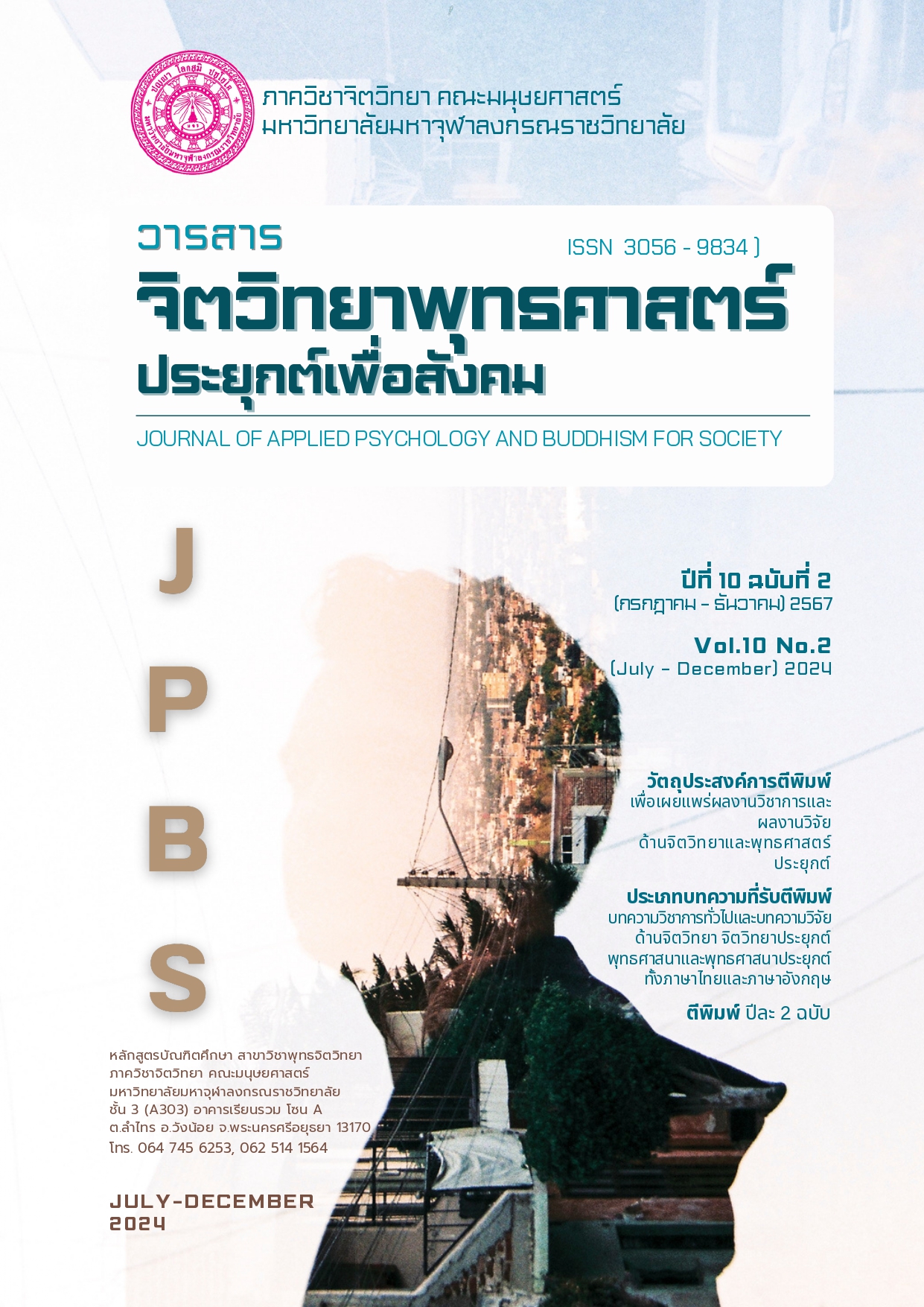Improving the Quality of Life through Chanting Buddhist Scriptures
Keywords:
Buddhist Psychology, Development, Quality of Life, ChantingAbstract
Buddhist psychology is a branch of religious wisdom focused on understanding and developing the human mind according to the teachings of the Buddha. Its goal is to help individuals comprehend the nature of mental states and learn how to enhance their potential for growth, fostering virtues in daily life. Buddhist psychology emphasizes the development of the mind, promoting calmness, wisdom, and social harmony. It encourages individuals to cultivate mindfulness and make beneficial contributions to society, following principles such as the Four Social Supports (Sangahavatthu) to lead a life of purpose. Chanting plays an important role in Buddhist practice, offering physical, mental, and social benefits. It helps alleviate physical suffering, strengthens the body, and promotes mental clarity and mindfulness. Furthermore, chanting supports the development of social ethics and fosters a moral society. By practicing mindfulness and cultivating a deeper understanding of oneself and the world, individuals can improve their quality of life. Both Buddhist psychology and chanting have the potential to enhance life quality, promote inner peace, and bring happiness.
References
ชวน เพชรแก้ว. (2532). การศึกษาวรรณคดีไทย. กรุงเทพฯ : โรงพิมพ์อักษรสัมพันธ์.
ธนิต อยู่โพธิ์. (2537). อนุภาพพระปริตร. กรุงเทพฯ : โรงพิมพ์มหาจุฬาลงกรณราชวิทยาลัย
บุญชม ศรีสะอาด. (2535). การวิจัยเบื้องต้น (พิมพ์ครั้งที่ 6). กรุงเทพฯ : สุวีริยาสาส์น.
พระครูศิริโสธรคณารักษ์. (2561). แนวทางการพัฒนาคุณภาพชีวิตตามโครงการสวดมนต์ข้ามปีของประชาชนในจังหวัดยโสธร (วิทยานิพนธ์ศาสนศาสตรมหาบัณฑิต สาขาพุทธศาสนาและปรัชญา). มหาวิทยาลัยมหามกุฏราชวิทยาลัย. นครปฐม.
พระธรรมกิตติวงศ์ (ทองดี สุรเตโช). (2553). พจนานุกรมเพื่อการศึกษาพุทธศาสน์ (พิมพ์ครั้งที่ 3). กรุงเทพฯ : ธรรมสภาและสถาบันบันลือธรรม.
พระธรรมปิฎก (ปอ.ปยุตโต). (2540). พุทธธรรมกับการพัฒนาชีวิต. กรุงเทพฯ: โรงพิมพ์ธรรมสภา.
พระมหาวุฒิชัย (ว.วชิรเมธี). (2553). 9 มนตเพื่อความกาวหนา. กรุงเทพฯ : สถาบันวิมุตตยาลัย.
พระมหาสุนทร สิริธมฺโม (เนเรียะ). (2545). การศึกษาวิเคราะหกรณีเมตตสูตร (วิทยานิพนธ์พุทธศาสตรมหาบัณฑิต). มหาวิทยาลัยมหาจุฬาลงกรณราชวิทยาลัย. กรุงเทพฯ.
พระศุภราชัย สุรสกฺโก (ล้วนศรี). (2563). การพัฒนาคุณภาพชีวิตด้วยการสวดมนต์ของชุมชนบัวขาวจังหวัดกาฬสินธุ์. วารสารบัณฑิตศึกษามหาจุฬาขอนแก่น, 7(4), 444-459.
มหาวิทยาลัยมหาจุฬาลงกรณราชวิทยาลัย. (2539). พระไตรปฎกภาษาไทย ฉบับมหาจุฬาลงกรณราชวิทยาลัย. เล่มที่ 3, 4, 6, 7, 11, 19, 21, 25, 39. กรุงเทพฯ : มหาจุฬาลงกรณราชวิทยาลัย.
ศรีสุรางค์ พูลทรัพย์. (2537). อารยธรรมตะวันออก (พิมพ์ครั้งที่ 7). กรุงเทพฯ: มหาวิทยาลัยธรรมศาสตร์.
Downloads
Published
How to Cite
Issue
Section
Categories
License
Copyright (c) 2024 Journal of Applied Psychology and Buddhism for Society

This work is licensed under a Creative Commons Attribution-NonCommercial-NoDerivatives 4.0 International License.






